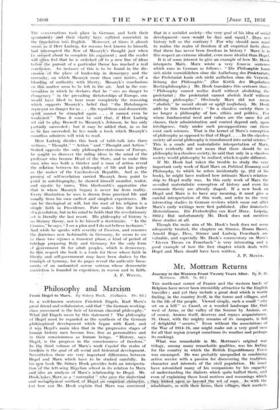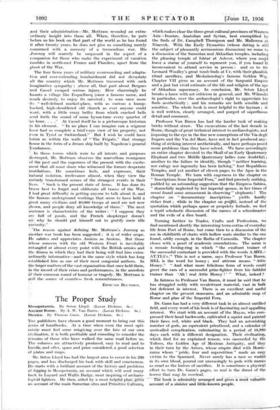Mr. Mottram Returns
TilE north-east corner of France and the western lands of Belgium have never been irresistibly attractive to the English traveller ; and yet they include a great deal which is worth finding:* the country itself, in the towns and villageS, and in the- lire of the people. Viewed simply, such a small ". city set on a hill" as Cassel, or a wooded landscape like-that west of -Arras, or the valley of the Somme by Amiens,- or, of course, Amiens itself, deserves and repays acquaintance. St. Omer, with the mighty remains of its ramparts, is full of delightful " secrets." Even without the associations of the War of 1914-18, one might make out a very good case for all that region (except sometimes its weather and peihaps its cooking).
What was remarkable in Mr. Mottram's original- war trilogy, among .many remarkable dualities, was his feeling for the country in which the British Expeditionary .Force was encamped. He was probably unequalled in combining active service with a passion for discovering the tradition, character and interests of the civil. population. He must have astonished many of his companions by his capacity of understanding the dialects which quite baffled them;- and even of explaining those local motives and reasonings .which titif44914tPLI _114014.A s*tPh the
inhabitants, so with their farms, their villages, their markets
an their administration—Mr. Mottram revealesi an extra- `ordiniry insight into them all. When, therefore, he puts' before us his book on that part of the world as he has found
it after twenty years, he does not give us something merely concerned with a memory of a tremendous war. His Journey will scarcely be surpassed in the aspect of a - companion for those who make the experiment of vacation rambles in north-east France and Flanders, apart from the ghost of the War.
The four fierce years of military overcrowding and adapta- tion and ever-extending bombardment did not devastate all the country which Mr. Mottram traversed with such imaginative sympathy ; above all, that part about Bergues and Cassel escaped serious injury. How charmingly he " haunts a village like Esquelbecq (once a famous name, and much desired), to enjoy its survival ; to scan once more its " well-defined market-place, with as curious a hump-
'backed, high-shouldered old church as ever anyone could want, with a little crazy belfry from which cracked bells send forth the sound of some hymn-tune every quarter of --an hour. . . ." At Cassel itself he is a picturesque historian in his element. " In no place I can imagine can a seigneur have had so complete a bird's-eye view of his property, not even in Tyrol or Switzerland." But I wish he could have taken us within the walls of " The Frigate," that strange house in the forin of a dream ship built by Napoleon's general .yandamme.
".`. In those towns which were to all intents and purposes destroyed, Mr. Mottram observes the marvellous resurgence of the past and the eagerness of the present with the excite= anent that all must share who witnessed the former desperate rnutilations. He sometimes feels, and expresses, their 'natural isolation, irrelevance almost, when they view the entirely transformed scenes of the strangest events in their lives. " Such is the present state of Arras. It has done its inave best to forget and obliterate all traces of the War. 1 had great difficulty in getting anyone to talk about it, and the famous underground workings that seem to have held a great many civilians and 40,000 troops at need are not now Shown, and people deny all knowledge of them." The next sentence is characteristic of the writer : " I suppose they are full of goods, and the French shopkeeper doesn't sec why he should put himself out to gratify mere idle
riosity."
The reason against defining Mr. Mottram's Journey as another war book has been suggested ; it is of wider scope. He salutes and appreciates Amiens as Amiens. But those *hose concern with the old Western Front is inevitably entangled at almost every point with the British armies and the drama in which they had their being will find him extra- Ordinarily informative—and in the same style which has long established him as one of their most congenial authors. In the larger matters of the vast organisation that once held them, in the record of their crises and performances, in the anecdote of their common round of humour or tragedy, Mr. Mottram is still the source of countless fresh remembrances.
EDMUND BLUNDEN.























































 Previous page
Previous page